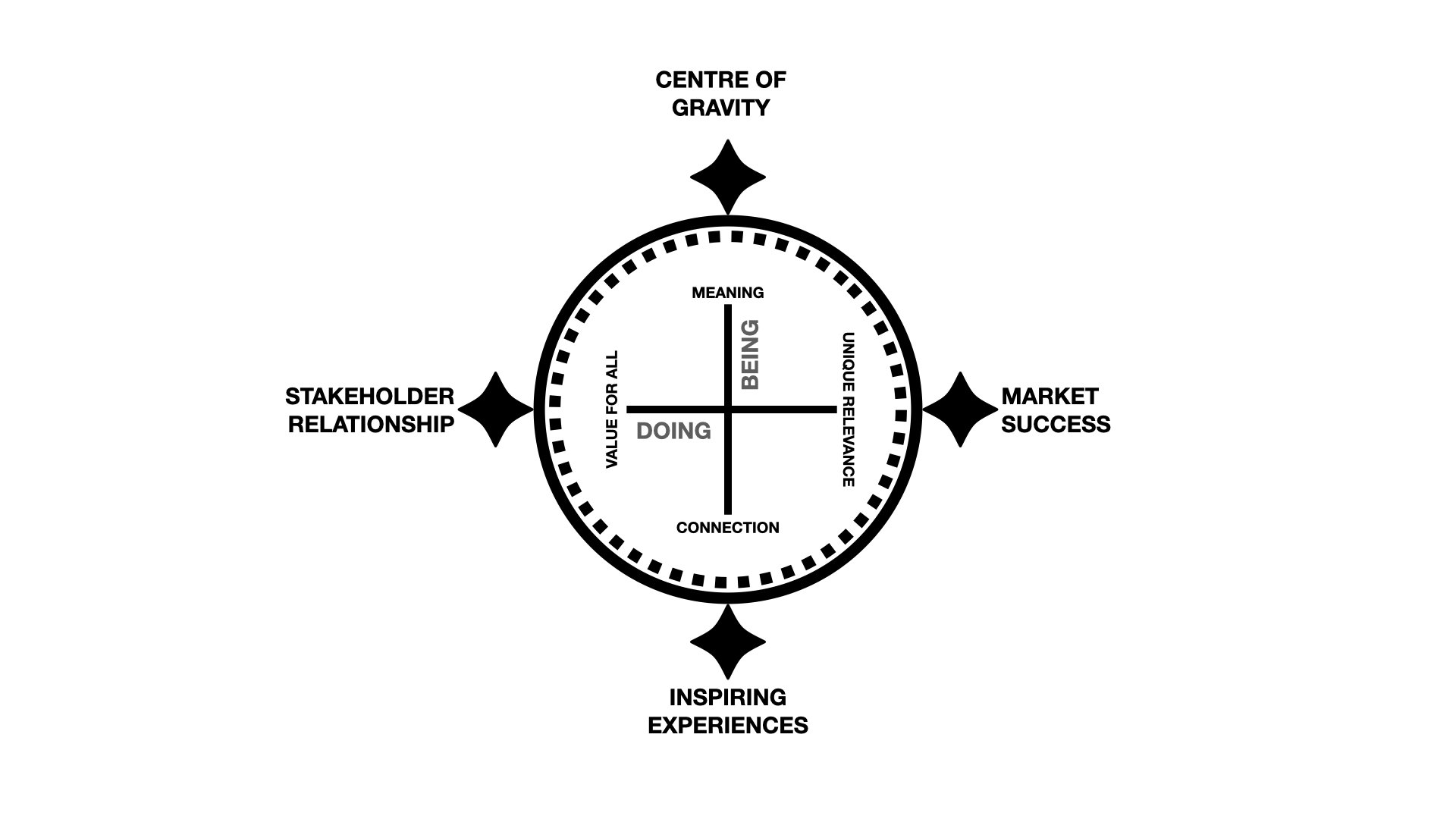A vision of happiness
Throughout ancient wisdom traditions, there is a recurring theme: the relentless quest for happiness and abundance, seen as a natural state of human beings. The concept of a utopian existence, often happening in a physical space as in the Garden of Eden, is present in various spiritual and mythological narratives. These stories symbolise a life that has reached its full potential for fulfilment. It is a vision that eludes the contemporary average person. We are more inclined to engage with dystopian narratives that perhaps reflect our soaring expectations or our desire to avoid undesirable futures.
Today, our economic landscape can appear inhospitable, marked by frequent crises, volatile markets, and governments struggling with economic forces that seem beyond their control. Moreover, businesses sometimes contribute to an environment of distress and distrust. In the face of such adversity, the general well being declines. It’s not right. It is our collective responsibility to place human beings at the centre of the economy, shifting the paradigm so that the market serves humanity, rather than the other way around. Business leaders bear a moral duty to see people as more than just consumers, embracing a broader vision of success that encompasses human happiness and well-being. In so doing, they will not only respond to increasing expectations from all their stakeholders, but will increase their chances of winning in the market, too. I will try to explain why and how.
Conscientious Brands as Catalysts for Positive Change
In 1968, during a speech at the University of Kansas, Robert Kennedy delivered a powerful message that challenged society’s narrow focus on economic indicators, such as GDP, as the sole measure of progress. He emphasised the importance of looking beyond material wealth and indicated that the true measure of a nation’s success lies in the well-being of its people. Kennedy’s vision highlighted the need to prioritise human values, social harmony, and individual fulfilment in the pursuit of a better society. More than fifty years have passed from the day Robert Kennedy addressed the students in Kansas City, but his words sound perfect for our days and our young generations seem to feel and live in accordance with his call. The difference now is that we look at brands (more than Governments) as the catalysts for positive change and ask them to play a role in building a better future.
Brands have the potential to act as powerful enablers for positive change in society and become important vehicles of dissemination of a vision of success that is more humane. Brands must transcend their traditional role as mere symbols of products and services, becoming enablers for meaningful experiences and platforms for sharing values and worldviews. By infusing brands with a higher purpose, business leaders can inspire and connect with consumers on a deeper level. This is not renouncing the economic success of a corporation: when brands align with the quest for human happiness and fulfilment, they create authentic and enduring relationships with their target audience, which translates into enhanced brand power and eventually into improved business performance. Brands that are able to enter in such a deep relationship with their public, rely on a high level of awareness and a strong commitment to positive impact on their stakeholders. We will call them conscientious brands.
Shifting Paradigms: From Shareholder Capitalism to Purpose-Driven Business
It is the right time for conscientious brands to emerge as a powerful force for good. There are clear signs that the general sentiment is calling for a shift in business. It’s not always been so. We have long lived with a different mindset and culture. Milton Friedman’s vision of shareholder capitalism, which advocates for a corporation’s sole responsibility to maximise profit for shareholders, emerged during the 1970s and influenced for a very long time the corporate culture. It was a time when businesses had lost sight of their purpose to serve people and became solely focused on financial gains. Friedman’s perspective failed to consider the broader implications of business practices on society and the environment: a perspective that is now gradually losing favour with some of the champions unexpectedly operating in the financial world (i.e.: Larry Fink of Black Rock). A stakeholder-centric view of business is gradually taking the centre stage.
Conscientious brands represent a paradigm shift from shareholder capitalism towards purpose-driven business models. They reject the notion that profit maximisation should come at the expense of social and environmental well-being. Instead, conscientious brands recognize the importance of stakeholder relationships, sustainability, and ethical practices in creating long-term, sustainable value. By putting purpose at the centre of their operations, conscientious brands aim to make a positive impact on society while still achieving financial success. Profit is not neglected: it is put in a systemic context. And it is worth noting that studies demonstrate that companies that are guided by a higher purpose normally overperform in financial terms those that operate in a profit-first mode.
At the core of conscientious branding lies purpose and more generally a moral compass that includes also clear principles and a shared culture that help the purpose guide action – I call the set of purpose, principles, and culture “the centre of gravity” of a business and its organisation. A higher purpose infuses conscientious brands with passion and a sense of meaning. It aligns stakeholders, inspires innovation, attracts like-minded consumers, and drives long-term sustainability.
Inspiring experiences
Many studies demonstrate that consumers yearn for genuine experiences and connections, something that brands can provide only by acting and thinking with integrity and authenticity. In an era of hyperconnectivity and pervasive information, conscientious brands that prioritise authenticity build trust with their audience, fostering emotional resonance and long-term loyalty. Authenticity is a never ending journey. It is the constant investigation of a brand’s true nature and its centre of gravity with a view to act in coherence and integrity.
By acting and communicating authentically, conscientious brands establish a sense of trust in their public that enhances their chance of sustainable growth. Moreover they engage in conversations and interactions that inspire their public and foster a sense of participation to a community of like minded people.
Impact and engagement
Conscientious brands recognize their role in creating positive impact. By aligning the brand with social or environmental causes, they provide opportunities for individuals to participate in meaningful change. Consumers, especially the young generations, are drawn to brands that share their values and by supporting conscientious brands, they feel a sense of fulfilment.
How Conscientious Brands Should Work
Professors Nicholas Ind and Oriol Iglesias have offered an insightful study of the nature and characteristics of conscientious brands in their book “In Good Conscience”. I invite you to read the book for a deep understanding of the matter.
I offer here an initial proposal for guiding the action of leaders that want to draw a practical plan around the ideas that are brilliantly laid out in that book.
Conscientious brands should operate on two distinct axes that shape their existence and impact.
- On one hand, there is the axis of being, which encompasses the brand’s essence and the generation of meaning.
- On the other hand, there is the axis of doing, which involves the creation of value and achieving business success in the market.
1. Axis of Being: Generating Meaning and Emotional Connection.
Conscientious brands recognize that they are more than just a platform for products or services; they are guided by a higher purpose, a specific culture, and a set of principles that guide them in creating a positive impact that is perceived as important by their public. In consequence, conscientious brands develop a clear centre of gravity, an identity that allows them to navigate the flux of events and contrasting market forces in integrity and coherence.
To operate effectively on this axis, conscientious brands:
- Have a “centre of gravity”: conscientious brands have a clear understanding of their identity, pursuing a purpose beyond profit-making. They articulate their higher mission and how it aligns with the well-being of individuals, communities, and the planet.
- Create inspiring experiences: It is crucial for conscientious brands to build genuine connections with their internal and external stakeholders. They strive to align their actions with their centre of gravity, demonstrating coherence and consistency in their behaviour and in communication.
2. Axis of Doing: Generating Value and Achieving Market Success
The axis of doing focuses on the brand’s ability to generate value for all stakeholders and achieve success in the market. Conscientious brands recognize the importance of financial sustainability and market viability to fulfil their purpose and drive positive change. To operate effectively on this axis, conscientious brands:
- Create Meaningful relations with Stakeholders: conscientious brands understand that they work in a system with their internal and external stakeholders and that it is necessary to offer them value that is perceived as relevant.
- Pursue Market Success: While conscientious brands prioritise their higher purpose, they also recognize the importance of business success to sustain their impact. They understand the need to remain competitive, innovate, and adapt to changing market dynamics, and they seek to generate value propositions that the public considers relevant and unique.
Balancing the Axes: Harmony and Impact
The challenge for conscientious brands lies in finding harmony between the axes of being and doing. They must stay true to their essence and generate meaning while also delivering value and achieving success in the market. When these axes are balanced effectively, conscientious brands can create a significant impact:
- Internal and External Alignment: conscientious brands foster alignment between their internal culture, principles, and the experiences they offer externally. This alignment creates a cohesive and authentic brand identity that resonates with both employees and customers.
- Positive Impact: By balancing the axes of being and doing, conscientious brands can generate lasting positive impact on society and the environment. They contribute to the well-being of individuals, communities, and the planet while also ensuring the long-term sustainability of their operations.
- Brand Power: conscientious brands that successfully navigate both axes gain a competitive edge in the market. They attract customers who align with their values, differentiate themselves from competitors, and establish a reputation that fosters brand attractiveness and customer loyalty.
Pursuing success through a conscientious approach to business is not the dream of wishful thinkers. It can be done with rigour and utter pragmatism. The right methodologies, some of them well known in business, and the right mindset can guide leaders and their teams on a roadmap to a success that is shared, possibly greater, certainly more fulfilling.
In Summary…
Conscientious brands operate on the axes of being and doing, with meaning pursued through a higher purpose, deep connection established through meaningful experiences, value for all ensured by understanding stakeholders, and market success attained through relevant and inspiring value propositions.
By balancing these elements, conscientious brands can create a positive impact and achieve long-term success while staying true to their unique identity and purpose.



1 comment
Join the conversationWe need great design and brands—now more than ever - May 9, 2025
[…] than reinvent the wheel, check out his article here. This sudden disinterest in positively valuing design is incredibly ill-timed considering the […]